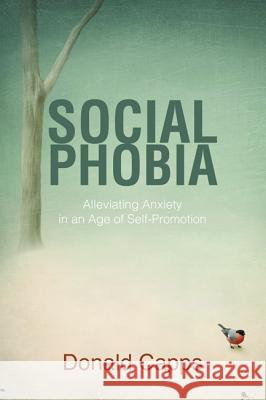Social Phobia » książka
Social Phobia
ISBN-13: 9781608994472 / Angielski / Miękka / 2010 / 192 str.
Social phobia is recognized by contemporary psychology as an anxiety disorder that significantly reduces effectiveness in personal interactions. Its exaggerated fear of negative evaluation in social situations leads people either to avoid social situations or to experience great discomfort in unavoidable ones. In this age of self-promotion, social phobics can find themselves at a distinct disadvantage in a society that values dominance. Social phobics rarely seek treatment for their disorder, but they do tend to seek out supportive social affiliation. They are likely to attend church services rather than more personally demanding social gatherings. Thus, religion can be a resource for creative adaptation to life with social phobia. This book helps pastoral counselors, ministers, and other religious partitioners understand social phobia from both the psychological and pastoral theological points of view. Donald Capps describes the condition and its psychological roots, surveys various therapeutic responses and their effectiveness, and points to the possibilities of religious alleviations. Throughout, he expresses a helpful sensitivity to the lived experience of social phobics and offers insights for healthy and adaptive ways of life. For those who experience social phobia and those who interact with them, this book will be a valuable resource. Donald Capps (1939-2015) was William Harte Felmeth Professor of Pastoral Theology (Emeritus) and Adjunct Professor at Princeton Theological Seminary. He is the author of Striking Out (Cascade Books, 2011), At Home in the World (Cascade Books, 2013), Still Growing (Cascade Books, 2014), and The Resourceful Self (Cascade Books, 2014). He is coauthor with Nathan Carlin of Living in Limbo (Cascade Books, 2010) and The Gift of Sublimation (Cascade Books, 2015).
Social phobia is recognized by contemporary psychology as an anxiety disorder that significantly reduces effectiveness in personal interactions. Its exaggerated fear of negative evaluation in social situations leads people either to avoid social situations or to experience great discomfort in unavoidable ones. In this age of self-promotion, social phobics can find themselves at a distinct disadvantage in a society that values dominance. Social phobics rarely seek treatment for their disorder, but they do tend to seek out supportive social affiliation. They are likely to attend church services rather than more personally demanding social gatherings. Thus, religion can be a resource for creative adaptation to life with social phobia. This book helps pastoral counselors, ministers, and other religious partitioners understand social phobia from both the psychological and pastoral theological points of view. Donald Capps describes the condition and its psychological roots, surveys various therapeutic responses and their effectiveness, and points to the possibilities of religious alleviations. Throughout, he expresses a helpful sensitivity to the lived experience of social phobics and offers insights for healthy and adaptive ways of life. For those who experience social phobia and those who interact with them, this book will be a valuable resource.Donald Capps (1939-2015) was William Harte Felmeth Professor of Pastoral Theology (Emeritus) and Adjunct Professor at Princeton Theological Seminary. He is the author of Striking Out (Cascade Books, 2011), At Home in the World (Cascade Books, 2013), Still Growing (Cascade Books, 2014), and The Resourceful Self (Cascade Books, 2014). He is coauthor with Nathan Carlin of Living in Limbo (Cascade Books, 2010) and The Gift of Sublimation (Cascade Books, 2015).











